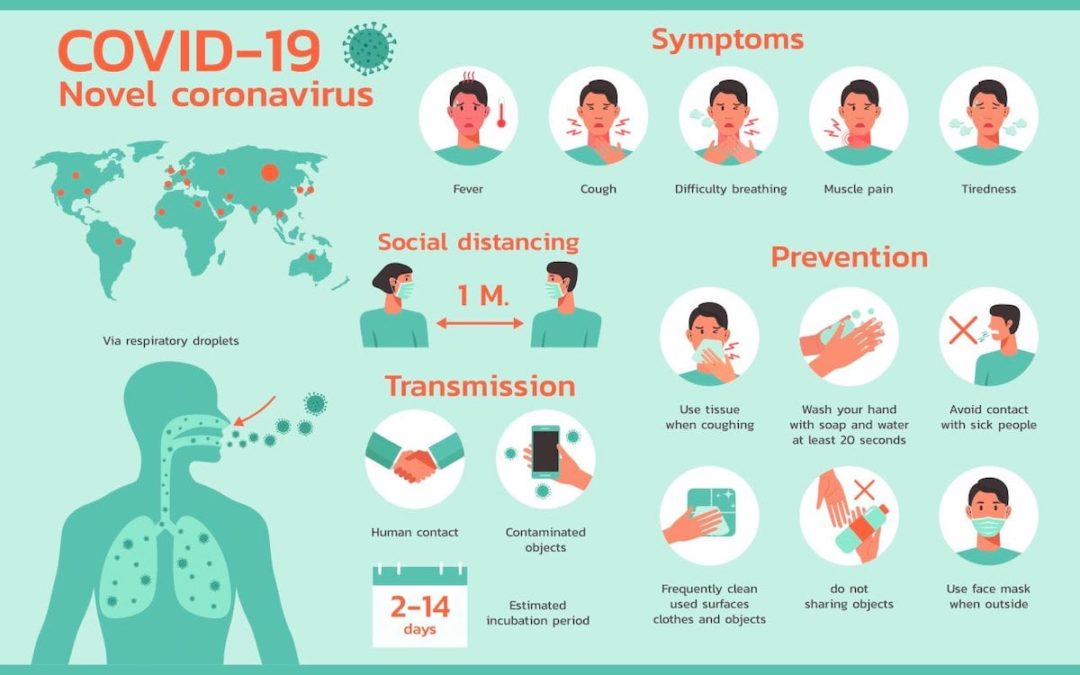Unfortunately, probably everyone you know has heard about COVID-19 (coronavirus 2 or SARS-CoV-2), which is a respiratory illness that can spread from person to person and has taken over 40,000 lives worldwide up to date.
According to authorities, the virus that causes COVID-19 is a novel coronavirus that mainly spreads when people are in close proximity (within about 6 feet) through respiratory droplets produced when an infected person coughs or sneezes. It can also be transmitted when a person touches a surface or object that has the virus on it and then touches his/her own mouth, nose, or possibly eyes, but this is not thought to be the main way the virus spreads.
Some of the most common symptoms are fever, cough, aches, and fatigue. Some people experience shortness of breath and sore throats. Serious symptoms are trouble breathing, chest pain, confusion, and/or bluish lips/face. The symptoms can appear anytime between 2-14 days after exposure.
Even though the situation looks bleak, we have to keep in mind the hard cold facts. Analysis of death cases shows the following demographic profile:
- 2/3 were male
- more than 80% were over 69 years old
- more than 75% of the cases had underlying diseases (cardiovascular diseases, diabetes, tumors)
COVID-19, in itself, is not a deadly virus. Mortality rates for those with COVID-19 seem to be 0.7-5.4%. The mortality rate for MERS is 34%, Influenza is 0.1%, and for Swine Flu is 0.02%. So, those with underlying diseases – compromised immunities, and non-healthy elders should be very cautious. For most people, the new coronavirus causes only mild to moderate symptoms, such as fever, aches, and cough.
How to Protect Against COVID-19
The virus is very contagious so you may be asking yourself how can you protect yourself against COVID-19. The best way to protect yourself is through everyday preventive actions. Here are some tips on how to stay healthy during this coronavirus outbreak:
HYGIENE
- Maintain commonsensical hygiene protocols.
- Avoid touching your eyes, nose, and mouth with unwashed hands.
- Wash your hands often with soap and water for at least 20 seconds. Use hand sanitizer if soap and water are not available.
- Cover your cough or sneeze with a tissue, then dispose of it.
NORMAL SICK PROTOCOLS
- Avoid close contact with people who are sick.
- If you are sick – experiencing symptoms, you should stay home.
MAINTAIN A HEALTHY IMMUNE SYSTEM
You should aim to keep a healthy immune system. This gives your body the opportunity to fight off this or any other virus in an aggressive manner, allowing you to experience fewer symptoms for a shorter period. The following are tips to maintain healthy immunity:
- EXERCISE: There is no going around this. You need at least 150 minutes per week of moderate exercise or 75 minutes per week of vigorous exercise. This can be split into thirty minutes of cardio a day, five times a week. Additionally, you need to engage in muscle-strengthening activities (such as lifting weights, calisthenics, or using resistance bands) that involve all major muscle groups on 2 or more days a week.
- EAT AN ORGANIC BALANCED DIET: Your body needs 5 to 9 servings of fruits and vegetables every day. So you should eat at least 3 servings of vegetables and 2 servings of fruit per day. Try to buy organic produce to avoid increasing your internal toxicity.
It’s important to incorporate enough fats into your diet (avocado, coconut oil, extra virgin olive oil, ghee, nuts, nut butters, seeds, and fatty fish) and protein (eggs, whey protein, antibiotic-free organic chicken, wild-caught fish, and organic grass-fed red meat. If you are vegetarian, incorporate spirulina, hemp, tempeh, quinoa, and legumes) as well.

- ELIMINATE OR RESTRICT TOXIC FOODS: Most people have a lot of processed food and products that do not nourish their bodies. Eliminate the habitual consumption of soda, fast food, white flour, commercial baked goods, cereal and chips, candy, fried foods, microwave popcorn, vegetable oils, deli meats, and most processed foods.
- STAY HYDRATED: Water helps your body flush toxins out and stimulate your lymphatic system, which carries white blood cells and other immune system cells. Try drinking water or herbal teas most of the day and avoid overdoing dehydrated drinks, like coffee, or high-caloric drinks and processed juices. Eat also more hydrating foods, such as cucumbers, celery, oranges, or watermelon.
- SLEEP: Rest is essential to keep your immune system functioning properly. If you are sleep deprived or are not getting good quality sleep, you are more likely to get sick. Read more on how to get a good night’s sleep.
- STRESS MANAGEMENT: It’s normal to be stressed from time to time but we can’t let it get a hold of us because it affects our immune function. It’s important to learn how to deal with stress in a healthy way.
- SUPPLEMENT: Even if you have a good healthy diet, you need to take high-quality supplements to help boost your immune system. The soil is not as it used to be decades ago, being more deficient in minerals and vitamins. In consequence, our food is not as nutritious and rich as before. Plus, we are dealing with not only environmental pollution in the air but in our homes through toxic products and radiation from our electronics and constant connection to WiFis.
COVID-19 can be a wake-up call for all of us, a call to realize that we only have one body and we must keep it well-functioning. This or any other virus has a detrimental grip on those whose bodies are not functioning optimally. Let’s focus on following regular hygiene protocols and the recommended social distancing. Remember that one of the most powerful weapons in the protection against COVID-19, or any other virus, is a healthy immune system. Keep in mind the protective and immune-boosting tips outlined above to get us through this coronavirus outbreak. ?
To a Healthier Fitter You,
The Fitness Wellness Mentor



